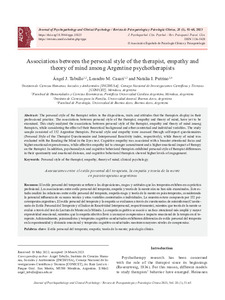Por favor, use este identificador para citar o enlazar este ítem:
https://repositorio.uca.edu.ar/handle/123456789/16403| Título: | Associations between the personal style of the therapist, empathy and theory of mind among Argentine psychotherapists Asociaciones entre el estilo personal del terapeuta, la empatía y teoría de la mente en psicoterapeutas argentinos |
Autor: | Tabullo, Ángel Javier Casari, Leandro M. Putrino, Natalia |
Palabras clave: | ESTILOS PERSONALES; PSICOLOGIA CLINICA; PSICOTERAPEUTAS; EMPATIA; TEORIA DE LA MENTE | Fecha de publicación: | 2023 | Editorial: | Asociación Española de Psicología Clínica Psicopatología Universidad Nacional de Educación a Distancia |
Cita: | Tabullo, Á. J., Casari, L. M., Putrino, N. Associations between the personal style of the therapist, empathy and theory of mind among Argentine psychotherapists [en línea]. Revista de Psicopatología y Psicología Clínica. 2023, 28 (1). doi:10.5944/rppc.33825. Disponible en: https://repositorio.uca.edu.ar/handle/123456789/16403 | Resumen: | Abstract: The personal style of the therapist refers to the dispositions, traits and attitudes that the therapists display in their
professional practice. The associations between personal style of the therapist, empathy and theory of mind, have yet to be
examined. This study analyzed the associations between personal style of the therapist, empathy and theory of mind among
therapists, while considering the effect of their theoretical background and other contextual and individual variables. The study
sample consisted of 152 Argentine therapists. Personal style and empathy were assessed through self-report questionnaires
(Personal Style of the Therapist Questionnaire and Interpersonal Reactivity index, respectively), while theory of mind was
evaluated with the Reading the Mind in the Eyes test. Cognitive empathy was associated with a broader attentional focus and
higher emotional expressiveness, while affective empathy led to stronger commitment and a higher emotional impact of therapy
on the therapist. In addition, psychoanalysts and cognitive behavioral therapists exhibited personal style of therapist differences
in their spontaneity and emotional distance, and cognitive behavioral therapists showed higher levels of engagement. Resumen: El estilo personal del terapeuta se refiere a las disposiciones, rasgos y actitudes que los terapeutas exhiben en su práctica profesional. Las asociaciones entre estilo personal del terapeuta, empatía y teoría de la mente aún no han sido examinadas. Este estudio analizó las relaciones entre estilo personal del terapeuta, empatía-rasgo y teoría de la mente en psicoterapeutas, considerando la potencial influencia de su marco teórico y otras variables contextuales e individuales. La muestra estuvo compuesta por 152 psicoterapeutas argentinos. El estilo personal del terapeuta y la empatía se evaluaron a través de cuestionarios de autoinforme (Cuestionario de Estilo Personal del Terapeuta y el Índice de Reactividad Interpersonal, respectivamente), mientras que teoría de la mente se evaluó a través del test de Lectura de Mente en la Mirada. La empatía cognitiva se asoció a un foco atencional más amplió y mayor expresividad emocional, mientras que la empatía afectiva llevó a un mayor compromiso e impacto emocional de la terapia en el terapeuta. Adicionalmente, psicoanalistas y terapeutas cognitivo-conductuales exhibieron diferencias de estilo personal del terapeuta en la espontaneidad y distancia emocional y terapeutas cognitivo-conductuales mostraron mayores niveles de compromiso. |
URI: | https://repositorio.uca.edu.ar/handle/123456789/16403 | ISSN: | 1136-5420 (impreso) 2254-6057 (online) |
Disciplina: | PSICOLOGIA | DOI: | 10.5944/rppc.33825 | Derechos: | Acceso abierto | Fuente: | Revista de Psicopatología y Psicología Clínica. 2023, 28 (1) |
| Aparece en las colecciones: | Artículos |
Ficheros en este ítem:
| Fichero | Descripción | Tamaño | Formato | |
|---|---|---|---|---|
| associations-between-personal-style.pdf | 860,28 kB | Adobe PDF |  Visualizar/Abrir |
Visualizaciones de página(s)
83
comprobado en 27-abr-2024
Descarga(s)
48
comprobado en 27-abr-2024
Google ScholarTM
Ver en Google Scholar
Altmetric
Altmetric
Este ítem está sujeto a una Licencia Creative Commons

